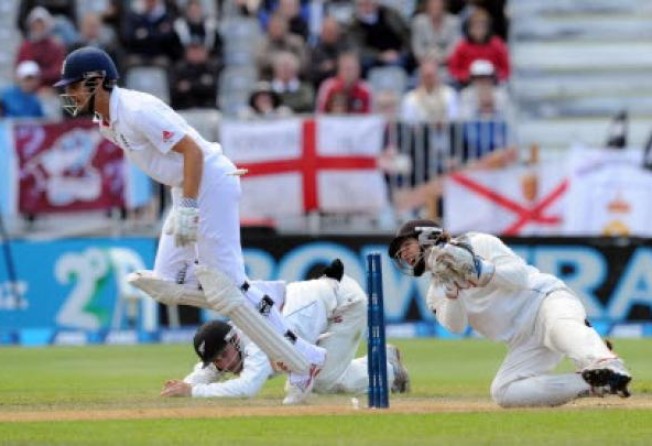England 234-1 vs NZ after day 4

Alastair Cook scored his 24th test century and Nick Compton his first Saturday in an 231-run opening partnership which steered England towards parity with New Zealand on the fourth day of the first test.
At stumps England was 234-1, 59 runs behind New Zealand with a day to play.
Cook was out for 116 two overs before stumps and Compton reached the close on 102 not out, eclipsing his previous highest test score of 57, as the opening pair erased much of New Zealand’s first innings lead.
It was the largest England opening partnership against New Zealand, surpassing the 30-year-old record of 223 held by Graham Fowler and Chris Tavare, and batted England into a position to secure a draw when the match concludes on Sunday.
New Zealand had control of the match when it declared on Saturday at 460-9 in reply to England’s 167. But through the efforts of Cook and Compton, England undid much of the damage sustained when it was bowled out in two sessions on day two.
Cook led his team’s gritty fightback with an outstanding century, achieved in 294 minutes from 221 balls with 13 fours. But Compton’s supporting and complementary innings was equally important and impressive.
He made a duck in the first innings and was under pressure to vindicate the faith of the England selectors in his ability to transfer profliic form in first class cricket into the test arena.
He also played under the long shadow of his grandfather, Denis Compton, which added the scrutiny he had to suffer in only his fifth test at the age of 29. Denis made 17 test centuries and Nick ensured on Saturday they joined five previous pairs of grandfathers and grandsons who have scored hundreds in tests.
He agonized for more than 30 minutes in the 90s, where Cook - England’s most prolific century maker - breezed through that area and reached his 100 with a sweep for four.
Compton’s maiden century finally came in the shadows of stumps, after Cook had been dismissed by left-armer Trent Boult and as he batted with nightwatchman Steve Finn. He reached the mark in 345 minutes and from 259 balls.
New Zealand fast bowler Tim Southee said the bowlers were bound to struggle as the University Oval pitch became increasingly placid.
“Cook’s wicket was a big one,” he said. “If there’s someone who can bat all day tomorrow it’s Alastair Cook.
“If we can grab a couple of wickets early tomorrow and make the most of the new ball then hopefully it goes a long way to setting up the day.”
New Zealand had the seized command of the test with an innings founded around Hamish Rutherford’s 171 on debut. Rutherford’s famous father, former New Zealand test captain Ken Rutherford, was at the University Oval to witness that moment on Friday and Compton’s father was among the crowd when his son’s maiden century highlighted Saturday’s play.
New Zealand began day four with some aggressive strokeplay to boost its lead, then declared 43 minutes after the start of play, having added 58 runs in 8.4 overs.
Cook and Compton pushed back against New Zealand’s dominance by reaching 58-0 against testing new ball bowling in the period before lunch. They then asserted themselves more fully by keeping their partnership intact between lunch and tea as the ball grew older and the pitch at the University Oval became more placid.
The England openers gradually got on top of the New Zealand attack and, for the first time in the match, placed the home side under pressure. They scored freely in singles, rotating the strike between left-handed Cook and right-handed Compton.
Compton produced a series of forceful drives off the back foot while Cook played with increasing fluency off the front foot. Despite the slowing pitch, both scored freely in front of the wicket.